Unit 12 OB Report: Influence, Motivation, and Teamwork at 4Com plc
VerifiedAdded on 2020/06/03
|17
|4468
|488
Report
AI Summary
This report examines organisational behaviour within the context of 4Com plc, a telecommunications company. It explores the influence of organisational culture, politics, and power on individual and team behaviour. The report delves into content and process theories of motivation, including Maslow's hierarchy of needs and reinforcement theory, and discusses motivational techniques. It differentiates between effective and ineffective teams, highlighting factors such as trust, shared goals, and mutual support. The report also applies organisational behaviour concepts to business solutions, offering a comprehensive analysis of workplace dynamics and leadership strategies within 4Com plc. The report also considers Hofstede’s dimensions of culture theory and its impact on the company's staff members culture, belief and values.
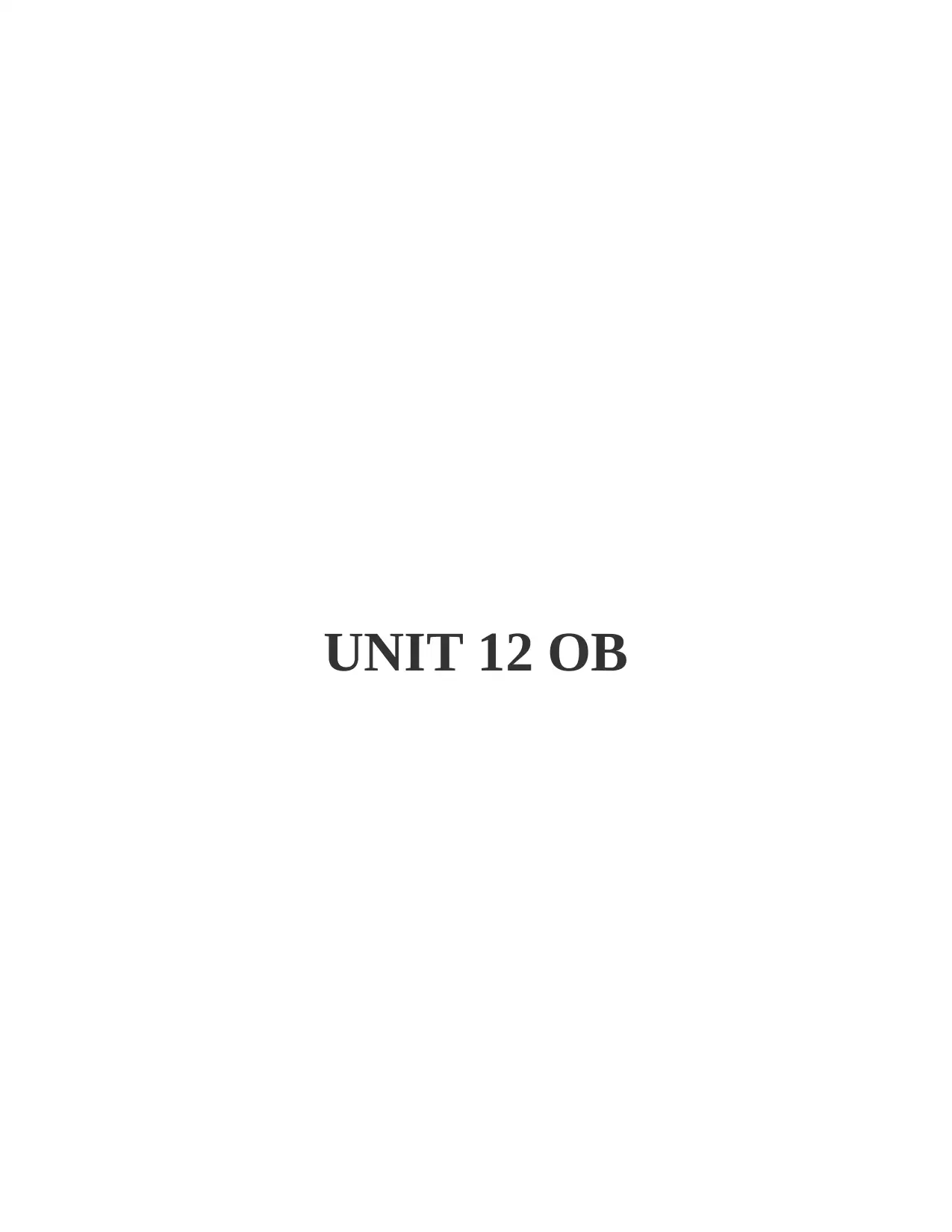
UNIT 12 OB
Paraphrase This Document
Need a fresh take? Get an instant paraphrase of this document with our AI Paraphraser
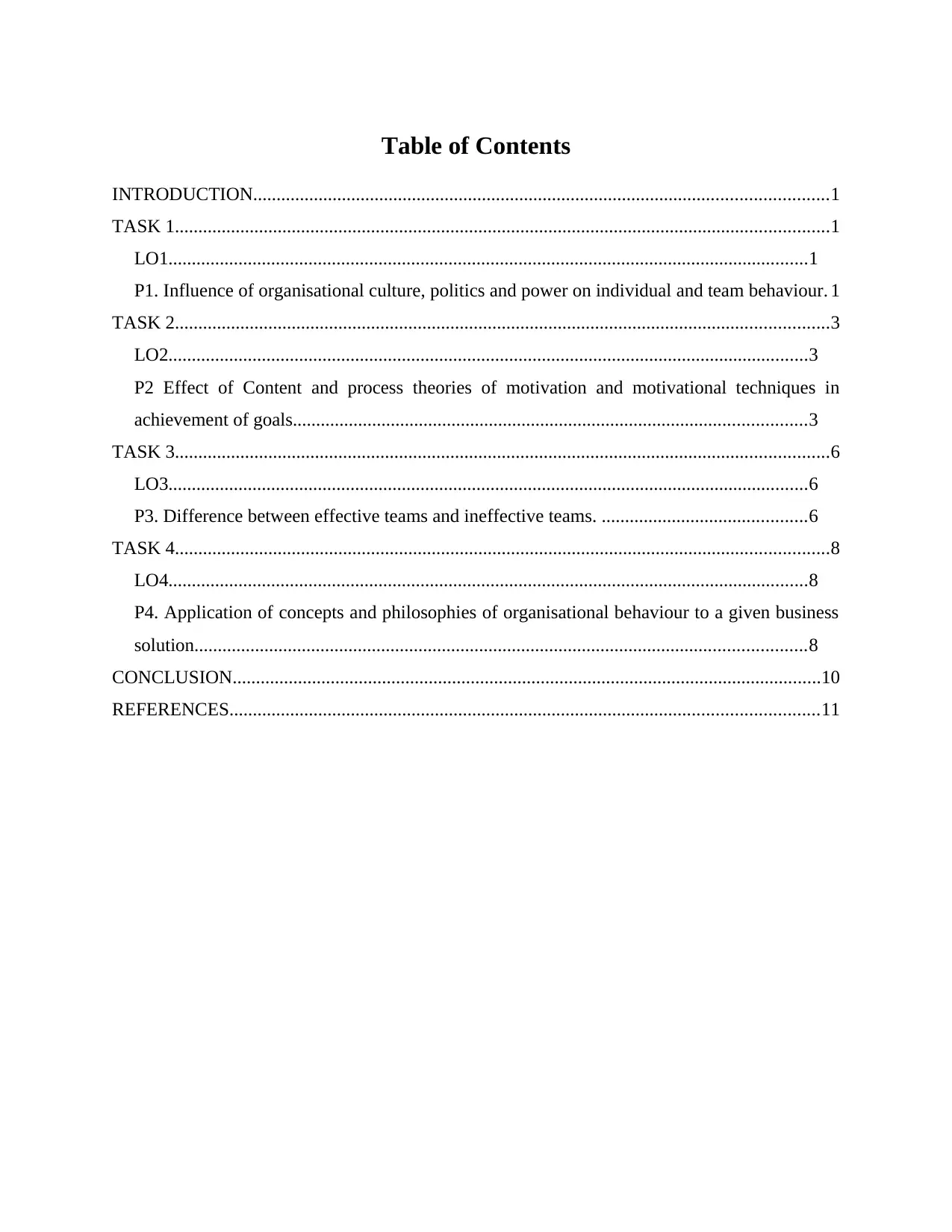
Table of Contents
INTRODUCTION...........................................................................................................................1
TASK 1............................................................................................................................................1
LO1.........................................................................................................................................1
P1. Influence of organisational culture, politics and power on individual and team behaviour. 1
TASK 2............................................................................................................................................3
LO2.........................................................................................................................................3
P2 Effect of Content and process theories of motivation and motivational techniques in
achievement of goals..............................................................................................................3
TASK 3............................................................................................................................................6
LO3.........................................................................................................................................6
P3. Difference between effective teams and ineffective teams. ............................................6
TASK 4............................................................................................................................................8
LO4.........................................................................................................................................8
P4. Application of concepts and philosophies of organisational behaviour to a given business
solution...................................................................................................................................8
CONCLUSION..............................................................................................................................10
REFERENCES..............................................................................................................................11
INTRODUCTION...........................................................................................................................1
TASK 1............................................................................................................................................1
LO1.........................................................................................................................................1
P1. Influence of organisational culture, politics and power on individual and team behaviour. 1
TASK 2............................................................................................................................................3
LO2.........................................................................................................................................3
P2 Effect of Content and process theories of motivation and motivational techniques in
achievement of goals..............................................................................................................3
TASK 3............................................................................................................................................6
LO3.........................................................................................................................................6
P3. Difference between effective teams and ineffective teams. ............................................6
TASK 4............................................................................................................................................8
LO4.........................................................................................................................................8
P4. Application of concepts and philosophies of organisational behaviour to a given business
solution...................................................................................................................................8
CONCLUSION..............................................................................................................................10
REFERENCES..............................................................................................................................11
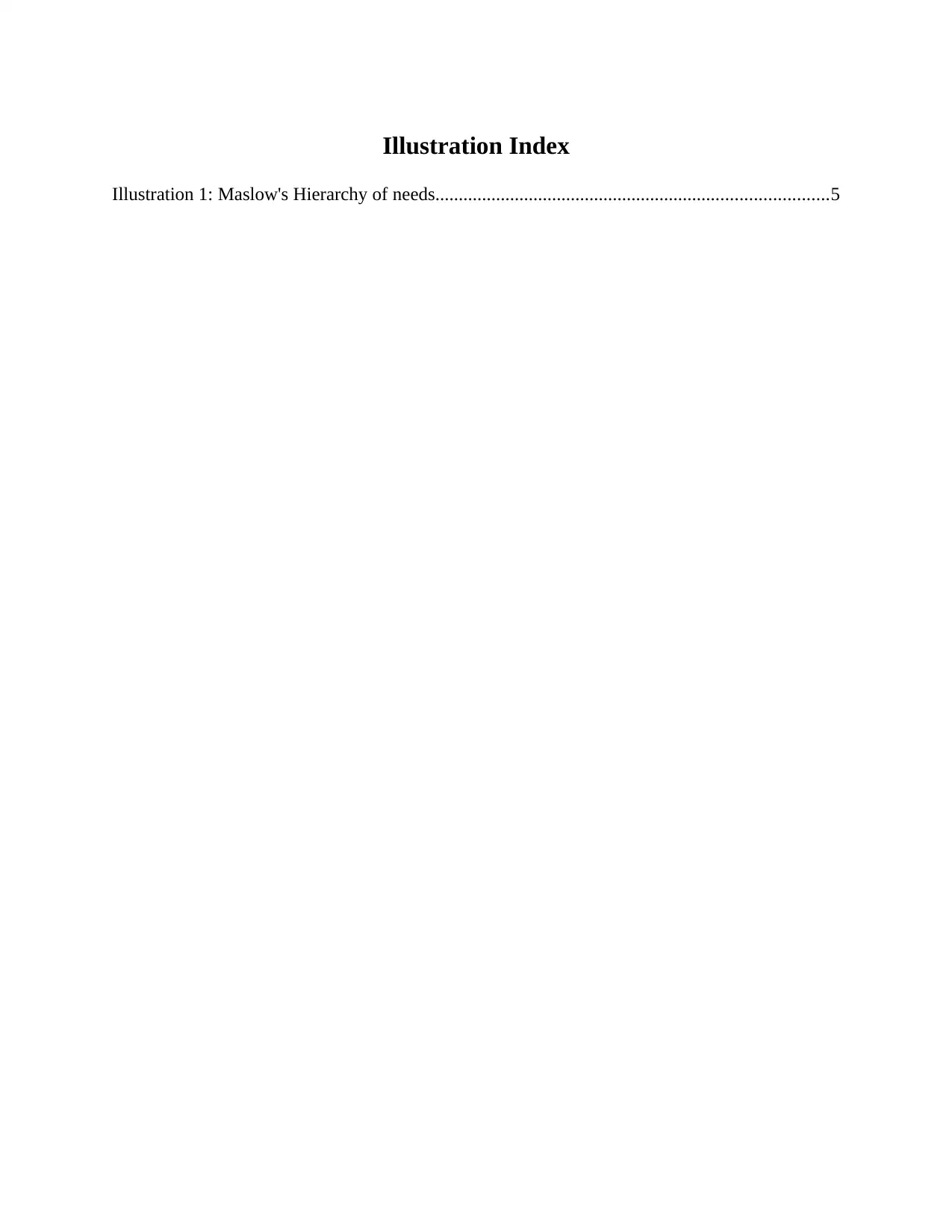
Illustration Index
Illustration 1: Maslow's Hierarchy of needs....................................................................................5
Illustration 1: Maslow's Hierarchy of needs....................................................................................5
⊘ This is a preview!⊘
Do you want full access?
Subscribe today to unlock all pages.

Trusted by 1+ million students worldwide
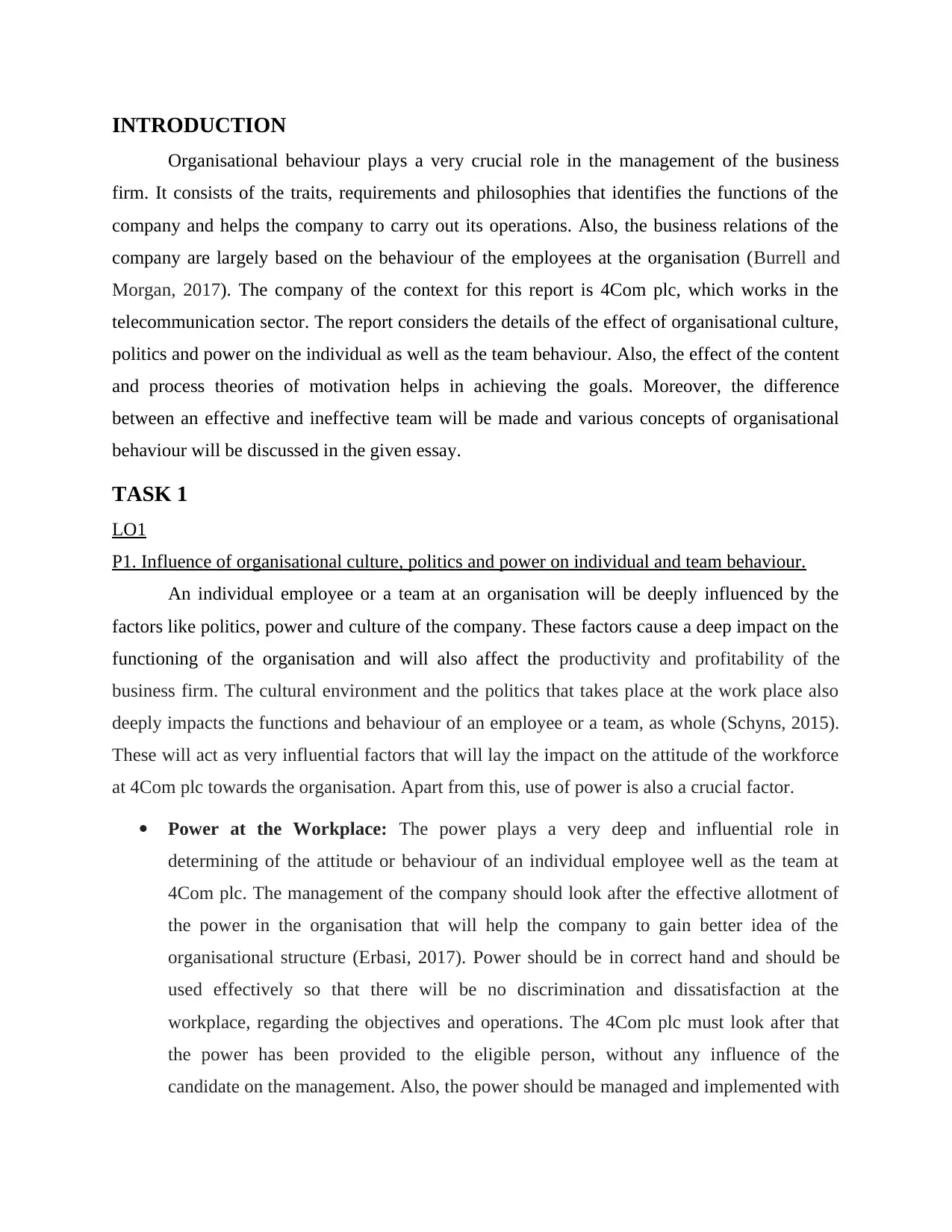
INTRODUCTION
Organisational behaviour plays a very crucial role in the management of the business
firm. It consists of the traits, requirements and philosophies that identifies the functions of the
company and helps the company to carry out its operations. Also, the business relations of the
company are largely based on the behaviour of the employees at the organisation (Burrell and
Morgan, 2017). The company of the context for this report is 4Com plc, which works in the
telecommunication sector. The report considers the details of the effect of organisational culture,
politics and power on the individual as well as the team behaviour. Also, the effect of the content
and process theories of motivation helps in achieving the goals. Moreover, the difference
between an effective and ineffective team will be made and various concepts of organisational
behaviour will be discussed in the given essay.
TASK 1
LO1
P1. Influence of organisational culture, politics and power on individual and team behaviour.
An individual employee or a team at an organisation will be deeply influenced by the
factors like politics, power and culture of the company. These factors cause a deep impact on the
functioning of the organisation and will also affect the productivity and profitability of the
business firm. The cultural environment and the politics that takes place at the work place also
deeply impacts the functions and behaviour of an employee or a team, as whole (Schyns, 2015).
These will act as very influential factors that will lay the impact on the attitude of the workforce
at 4Com plc towards the organisation. Apart from this, use of power is also a crucial factor.
Power at the Workplace: The power plays a very deep and influential role in
determining of the attitude or behaviour of an individual employee well as the team at
4Com plc. The management of the company should look after the effective allotment of
the power in the organisation that will help the company to gain better idea of the
organisational structure (Erbasi, 2017). Power should be in correct hand and should be
used effectively so that there will be no discrimination and dissatisfaction at the
workplace, regarding the objectives and operations. The 4Com plc must look after that
the power has been provided to the eligible person, without any influence of the
candidate on the management. Also, the power should be managed and implemented with
Organisational behaviour plays a very crucial role in the management of the business
firm. It consists of the traits, requirements and philosophies that identifies the functions of the
company and helps the company to carry out its operations. Also, the business relations of the
company are largely based on the behaviour of the employees at the organisation (Burrell and
Morgan, 2017). The company of the context for this report is 4Com plc, which works in the
telecommunication sector. The report considers the details of the effect of organisational culture,
politics and power on the individual as well as the team behaviour. Also, the effect of the content
and process theories of motivation helps in achieving the goals. Moreover, the difference
between an effective and ineffective team will be made and various concepts of organisational
behaviour will be discussed in the given essay.
TASK 1
LO1
P1. Influence of organisational culture, politics and power on individual and team behaviour.
An individual employee or a team at an organisation will be deeply influenced by the
factors like politics, power and culture of the company. These factors cause a deep impact on the
functioning of the organisation and will also affect the productivity and profitability of the
business firm. The cultural environment and the politics that takes place at the work place also
deeply impacts the functions and behaviour of an employee or a team, as whole (Schyns, 2015).
These will act as very influential factors that will lay the impact on the attitude of the workforce
at 4Com plc towards the organisation. Apart from this, use of power is also a crucial factor.
Power at the Workplace: The power plays a very deep and influential role in
determining of the attitude or behaviour of an individual employee well as the team at
4Com plc. The management of the company should look after the effective allotment of
the power in the organisation that will help the company to gain better idea of the
organisational structure (Erbasi, 2017). Power should be in correct hand and should be
used effectively so that there will be no discrimination and dissatisfaction at the
workplace, regarding the objectives and operations. The 4Com plc must look after that
the power has been provided to the eligible person, without any influence of the
candidate on the management. Also, the power should be managed and implemented with
Paraphrase This Document
Need a fresh take? Get an instant paraphrase of this document with our AI Paraphraser
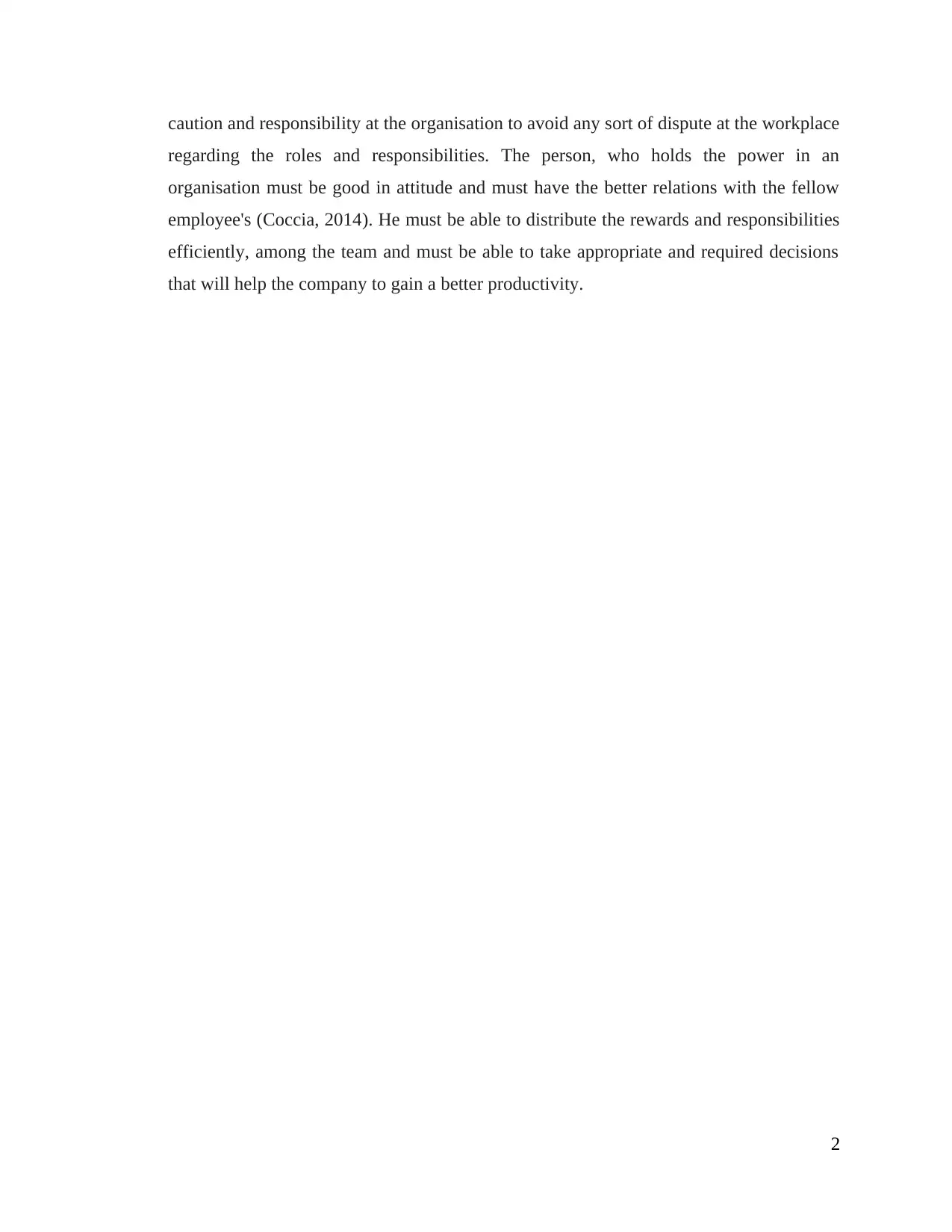
caution and responsibility at the organisation to avoid any sort of dispute at the workplace
regarding the roles and responsibilities. The person, who holds the power in an
organisation must be good in attitude and must have the better relations with the fellow
employee's (Coccia, 2014). He must be able to distribute the rewards and responsibilities
efficiently, among the team and must be able to take appropriate and required decisions
that will help the company to gain a better productivity.
2
regarding the roles and responsibilities. The person, who holds the power in an
organisation must be good in attitude and must have the better relations with the fellow
employee's (Coccia, 2014). He must be able to distribute the rewards and responsibilities
efficiently, among the team and must be able to take appropriate and required decisions
that will help the company to gain a better productivity.
2
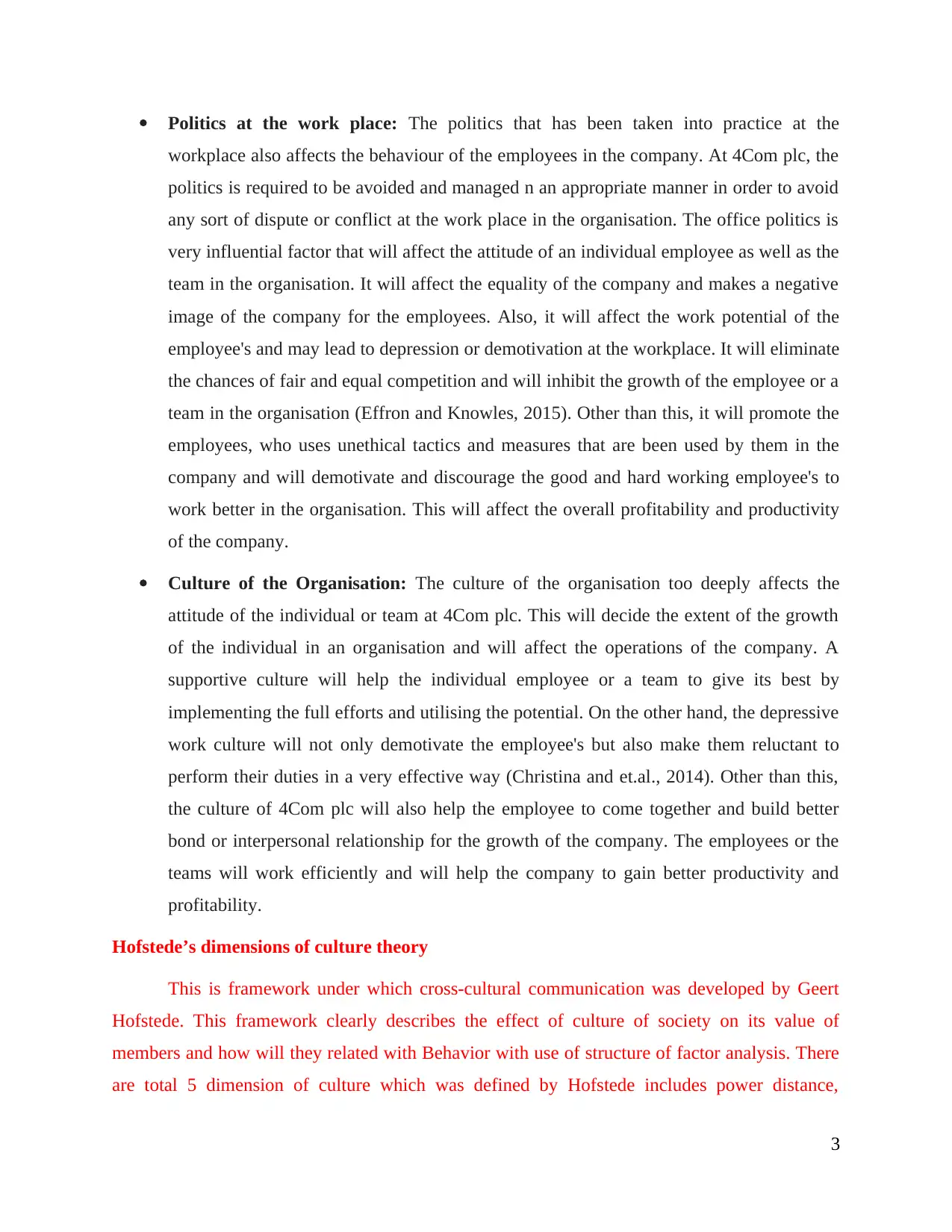
Politics at the work place: The politics that has been taken into practice at the
workplace also affects the behaviour of the employees in the company. At 4Com plc, the
politics is required to be avoided and managed n an appropriate manner in order to avoid
any sort of dispute or conflict at the work place in the organisation. The office politics is
very influential factor that will affect the attitude of an individual employee as well as the
team in the organisation. It will affect the equality of the company and makes a negative
image of the company for the employees. Also, it will affect the work potential of the
employee's and may lead to depression or demotivation at the workplace. It will eliminate
the chances of fair and equal competition and will inhibit the growth of the employee or a
team in the organisation (Effron and Knowles, 2015). Other than this, it will promote the
employees, who uses unethical tactics and measures that are been used by them in the
company and will demotivate and discourage the good and hard working employee's to
work better in the organisation. This will affect the overall profitability and productivity
of the company.
Culture of the Organisation: The culture of the organisation too deeply affects the
attitude of the individual or team at 4Com plc. This will decide the extent of the growth
of the individual in an organisation and will affect the operations of the company. A
supportive culture will help the individual employee or a team to give its best by
implementing the full efforts and utilising the potential. On the other hand, the depressive
work culture will not only demotivate the employee's but also make them reluctant to
perform their duties in a very effective way (Christina and et.al., 2014). Other than this,
the culture of 4Com plc will also help the employee to come together and build better
bond or interpersonal relationship for the growth of the company. The employees or the
teams will work efficiently and will help the company to gain better productivity and
profitability.
Hofstede’s dimensions of culture theory
This is framework under which cross-cultural communication was developed by Geert
Hofstede. This framework clearly describes the effect of culture of society on its value of
members and how will they related with Behavior with use of structure of factor analysis. There
are total 5 dimension of culture which was defined by Hofstede includes power distance,
3
workplace also affects the behaviour of the employees in the company. At 4Com plc, the
politics is required to be avoided and managed n an appropriate manner in order to avoid
any sort of dispute or conflict at the work place in the organisation. The office politics is
very influential factor that will affect the attitude of an individual employee as well as the
team in the organisation. It will affect the equality of the company and makes a negative
image of the company for the employees. Also, it will affect the work potential of the
employee's and may lead to depression or demotivation at the workplace. It will eliminate
the chances of fair and equal competition and will inhibit the growth of the employee or a
team in the organisation (Effron and Knowles, 2015). Other than this, it will promote the
employees, who uses unethical tactics and measures that are been used by them in the
company and will demotivate and discourage the good and hard working employee's to
work better in the organisation. This will affect the overall profitability and productivity
of the company.
Culture of the Organisation: The culture of the organisation too deeply affects the
attitude of the individual or team at 4Com plc. This will decide the extent of the growth
of the individual in an organisation and will affect the operations of the company. A
supportive culture will help the individual employee or a team to give its best by
implementing the full efforts and utilising the potential. On the other hand, the depressive
work culture will not only demotivate the employee's but also make them reluctant to
perform their duties in a very effective way (Christina and et.al., 2014). Other than this,
the culture of 4Com plc will also help the employee to come together and build better
bond or interpersonal relationship for the growth of the company. The employees or the
teams will work efficiently and will help the company to gain better productivity and
profitability.
Hofstede’s dimensions of culture theory
This is framework under which cross-cultural communication was developed by Geert
Hofstede. This framework clearly describes the effect of culture of society on its value of
members and how will they related with Behavior with use of structure of factor analysis. There
are total 5 dimension of culture which was defined by Hofstede includes power distance,
3
⊘ This is a preview!⊘
Do you want full access?
Subscribe today to unlock all pages.

Trusted by 1+ million students worldwide
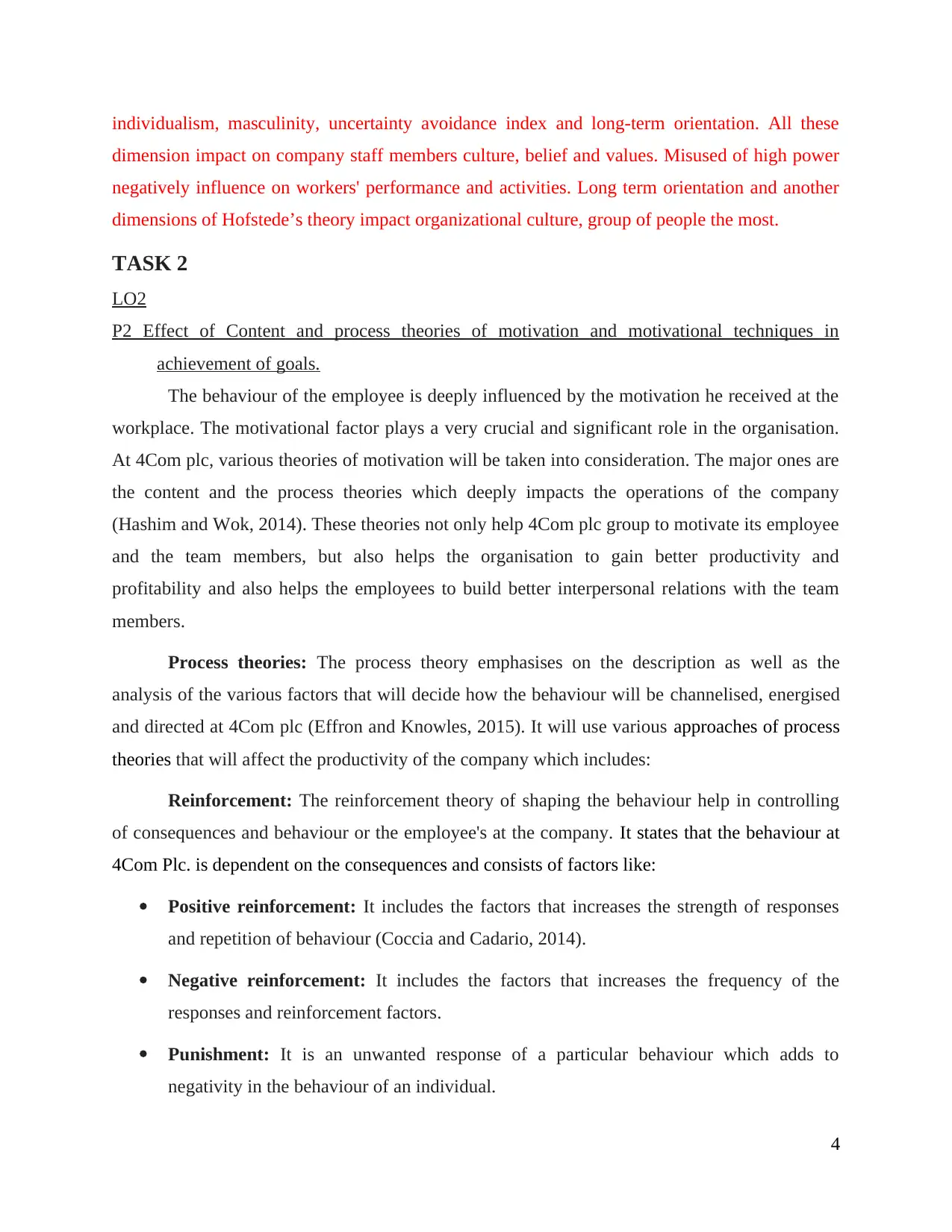
individualism, masculinity, uncertainty avoidance index and long-term orientation. All these
dimension impact on company staff members culture, belief and values. Misused of high power
negatively influence on workers' performance and activities. Long term orientation and another
dimensions of Hofstede’s theory impact organizational culture, group of people the most.
TASK 2
LO2
P2 Effect of Content and process theories of motivation and motivational techniques in
achievement of goals.
The behaviour of the employee is deeply influenced by the motivation he received at the
workplace. The motivational factor plays a very crucial and significant role in the organisation.
At 4Com plc, various theories of motivation will be taken into consideration. The major ones are
the content and the process theories which deeply impacts the operations of the company
(Hashim and Wok, 2014). These theories not only help 4Com plc group to motivate its employee
and the team members, but also helps the organisation to gain better productivity and
profitability and also helps the employees to build better interpersonal relations with the team
members.
Process theories: The process theory emphasises on the description as well as the
analysis of the various factors that will decide how the behaviour will be channelised, energised
and directed at 4Com plc (Effron and Knowles, 2015). It will use various approaches of process
theories that will affect the productivity of the company which includes:
Reinforcement: The reinforcement theory of shaping the behaviour help in controlling
of consequences and behaviour or the employee's at the company. It states that the behaviour at
4Com Plc. is dependent on the consequences and consists of factors like:
Positive reinforcement: It includes the factors that increases the strength of responses
and repetition of behaviour (Coccia and Cadario, 2014).
Negative reinforcement: It includes the factors that increases the frequency of the
responses and reinforcement factors.
Punishment: It is an unwanted response of a particular behaviour which adds to
negativity in the behaviour of an individual.
4
dimension impact on company staff members culture, belief and values. Misused of high power
negatively influence on workers' performance and activities. Long term orientation and another
dimensions of Hofstede’s theory impact organizational culture, group of people the most.
TASK 2
LO2
P2 Effect of Content and process theories of motivation and motivational techniques in
achievement of goals.
The behaviour of the employee is deeply influenced by the motivation he received at the
workplace. The motivational factor plays a very crucial and significant role in the organisation.
At 4Com plc, various theories of motivation will be taken into consideration. The major ones are
the content and the process theories which deeply impacts the operations of the company
(Hashim and Wok, 2014). These theories not only help 4Com plc group to motivate its employee
and the team members, but also helps the organisation to gain better productivity and
profitability and also helps the employees to build better interpersonal relations with the team
members.
Process theories: The process theory emphasises on the description as well as the
analysis of the various factors that will decide how the behaviour will be channelised, energised
and directed at 4Com plc (Effron and Knowles, 2015). It will use various approaches of process
theories that will affect the productivity of the company which includes:
Reinforcement: The reinforcement theory of shaping the behaviour help in controlling
of consequences and behaviour or the employee's at the company. It states that the behaviour at
4Com Plc. is dependent on the consequences and consists of factors like:
Positive reinforcement: It includes the factors that increases the strength of responses
and repetition of behaviour (Coccia and Cadario, 2014).
Negative reinforcement: It includes the factors that increases the frequency of the
responses and reinforcement factors.
Punishment: It is an unwanted response of a particular behaviour which adds to
negativity in the behaviour of an individual.
4
Paraphrase This Document
Need a fresh take? Get an instant paraphrase of this document with our AI Paraphraser
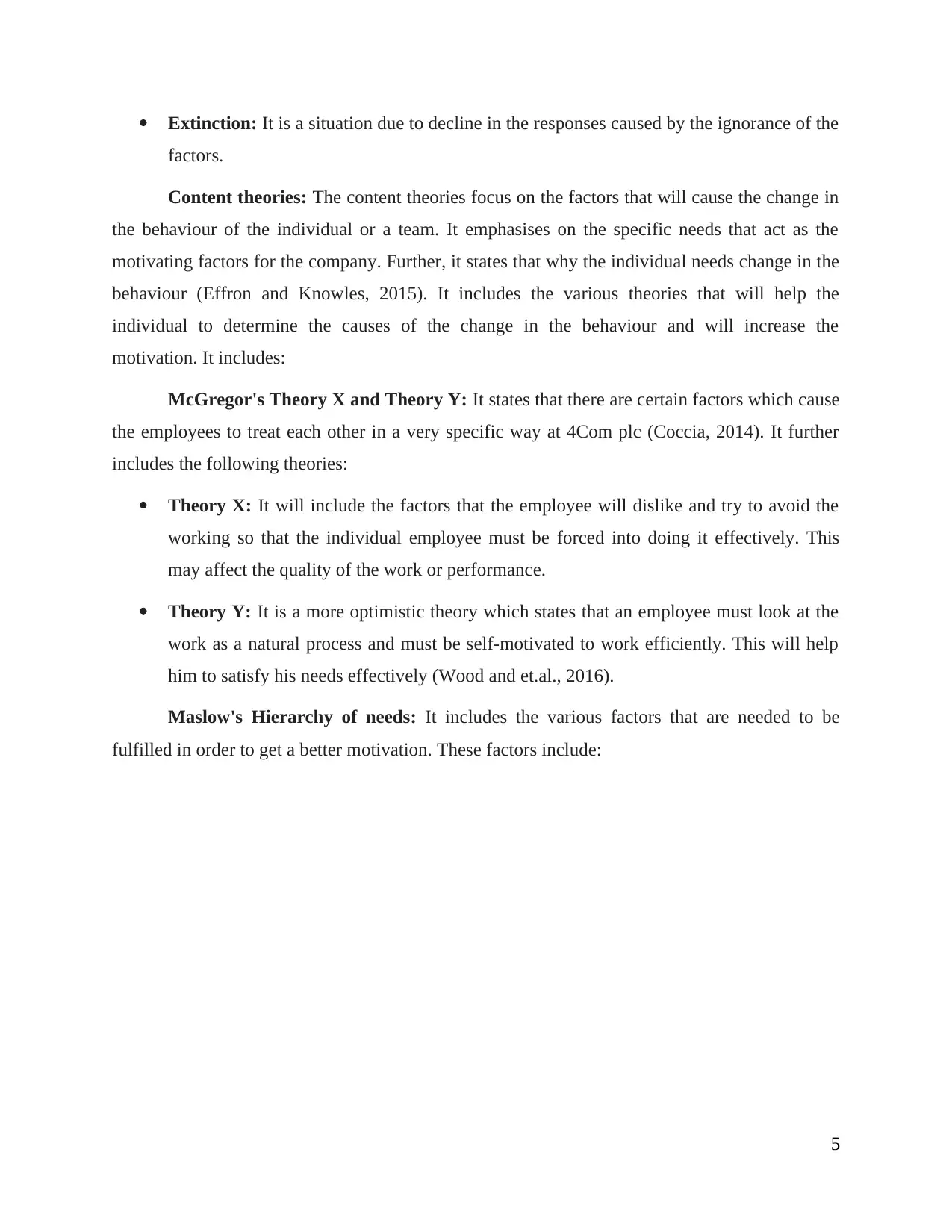
Extinction: It is a situation due to decline in the responses caused by the ignorance of the
factors.
Content theories: The content theories focus on the factors that will cause the change in
the behaviour of the individual or a team. It emphasises on the specific needs that act as the
motivating factors for the company. Further, it states that why the individual needs change in the
behaviour (Effron and Knowles, 2015). It includes the various theories that will help the
individual to determine the causes of the change in the behaviour and will increase the
motivation. It includes:
McGregor's Theory X and Theory Y: It states that there are certain factors which cause
the employees to treat each other in a very specific way at 4Com plc (Coccia, 2014). It further
includes the following theories:
Theory X: It will include the factors that the employee will dislike and try to avoid the
working so that the individual employee must be forced into doing it effectively. This
may affect the quality of the work or performance.
Theory Y: It is a more optimistic theory which states that an employee must look at the
work as a natural process and must be self-motivated to work efficiently. This will help
him to satisfy his needs effectively (Wood and et.al., 2016).
Maslow's Hierarchy of needs: It includes the various factors that are needed to be
fulfilled in order to get a better motivation. These factors include:
5
factors.
Content theories: The content theories focus on the factors that will cause the change in
the behaviour of the individual or a team. It emphasises on the specific needs that act as the
motivating factors for the company. Further, it states that why the individual needs change in the
behaviour (Effron and Knowles, 2015). It includes the various theories that will help the
individual to determine the causes of the change in the behaviour and will increase the
motivation. It includes:
McGregor's Theory X and Theory Y: It states that there are certain factors which cause
the employees to treat each other in a very specific way at 4Com plc (Coccia, 2014). It further
includes the following theories:
Theory X: It will include the factors that the employee will dislike and try to avoid the
working so that the individual employee must be forced into doing it effectively. This
may affect the quality of the work or performance.
Theory Y: It is a more optimistic theory which states that an employee must look at the
work as a natural process and must be self-motivated to work efficiently. This will help
him to satisfy his needs effectively (Wood and et.al., 2016).
Maslow's Hierarchy of needs: It includes the various factors that are needed to be
fulfilled in order to get a better motivation. These factors include:
5
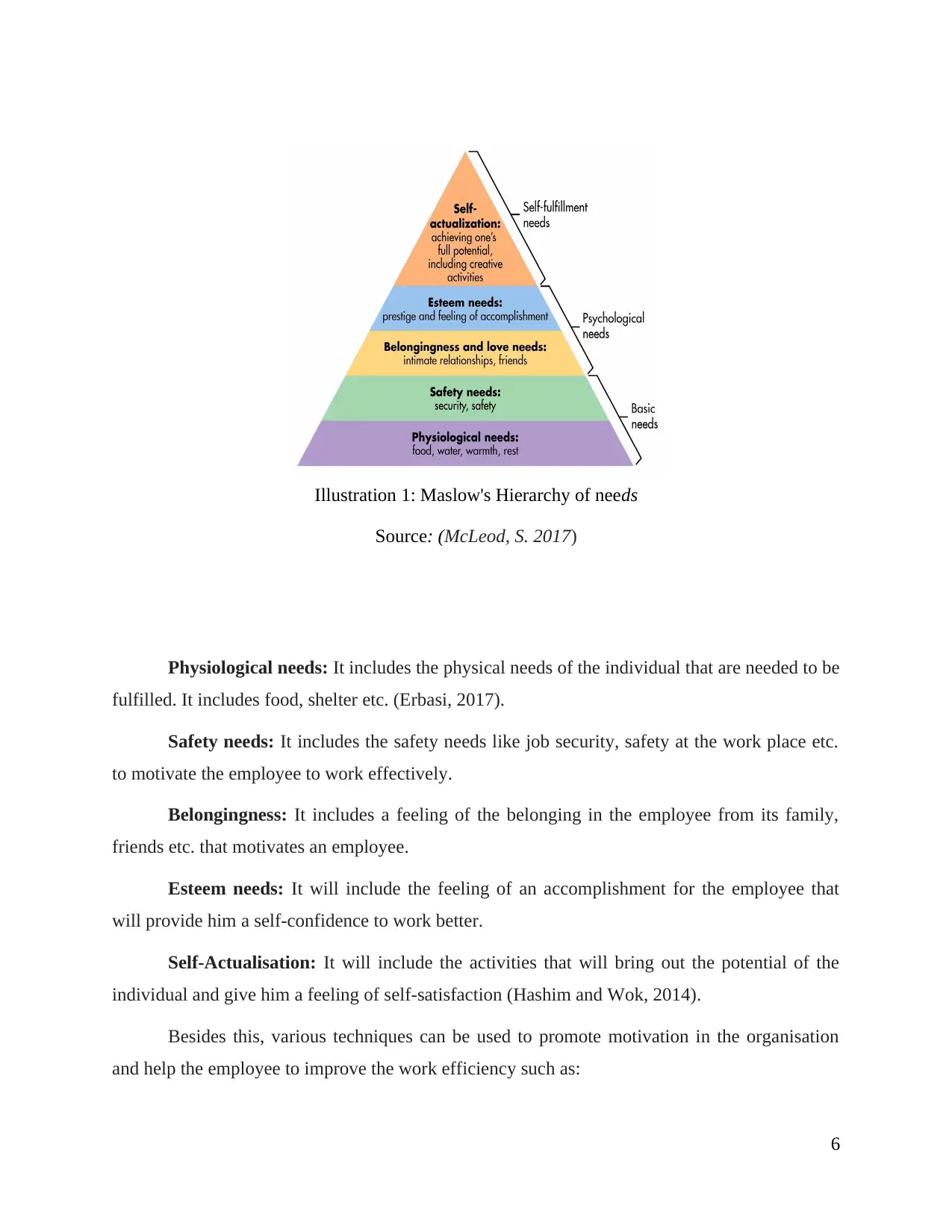
Physiological needs: It includes the physical needs of the individual that are needed to be
fulfilled. It includes food, shelter etc. (Erbasi, 2017).
Safety needs: It includes the safety needs like job security, safety at the work place etc.
to motivate the employee to work effectively.
Belongingness: It includes a feeling of the belonging in the employee from its family,
friends etc. that motivates an employee.
Esteem needs: It will include the feeling of an accomplishment for the employee that
will provide him a self-confidence to work better.
Self-Actualisation: It will include the activities that will bring out the potential of the
individual and give him a feeling of self-satisfaction (Hashim and Wok, 2014).
Besides this, various techniques can be used to promote motivation in the organisation
and help the employee to improve the work efficiency such as:
6
Illustration 1: Maslow's Hierarchy of needs
Source: (McLeod, S. 2017)
fulfilled. It includes food, shelter etc. (Erbasi, 2017).
Safety needs: It includes the safety needs like job security, safety at the work place etc.
to motivate the employee to work effectively.
Belongingness: It includes a feeling of the belonging in the employee from its family,
friends etc. that motivates an employee.
Esteem needs: It will include the feeling of an accomplishment for the employee that
will provide him a self-confidence to work better.
Self-Actualisation: It will include the activities that will bring out the potential of the
individual and give him a feeling of self-satisfaction (Hashim and Wok, 2014).
Besides this, various techniques can be used to promote motivation in the organisation
and help the employee to improve the work efficiency such as:
6
Illustration 1: Maslow's Hierarchy of needs
Source: (McLeod, S. 2017)
⊘ This is a preview!⊘
Do you want full access?
Subscribe today to unlock all pages.

Trusted by 1+ million students worldwide
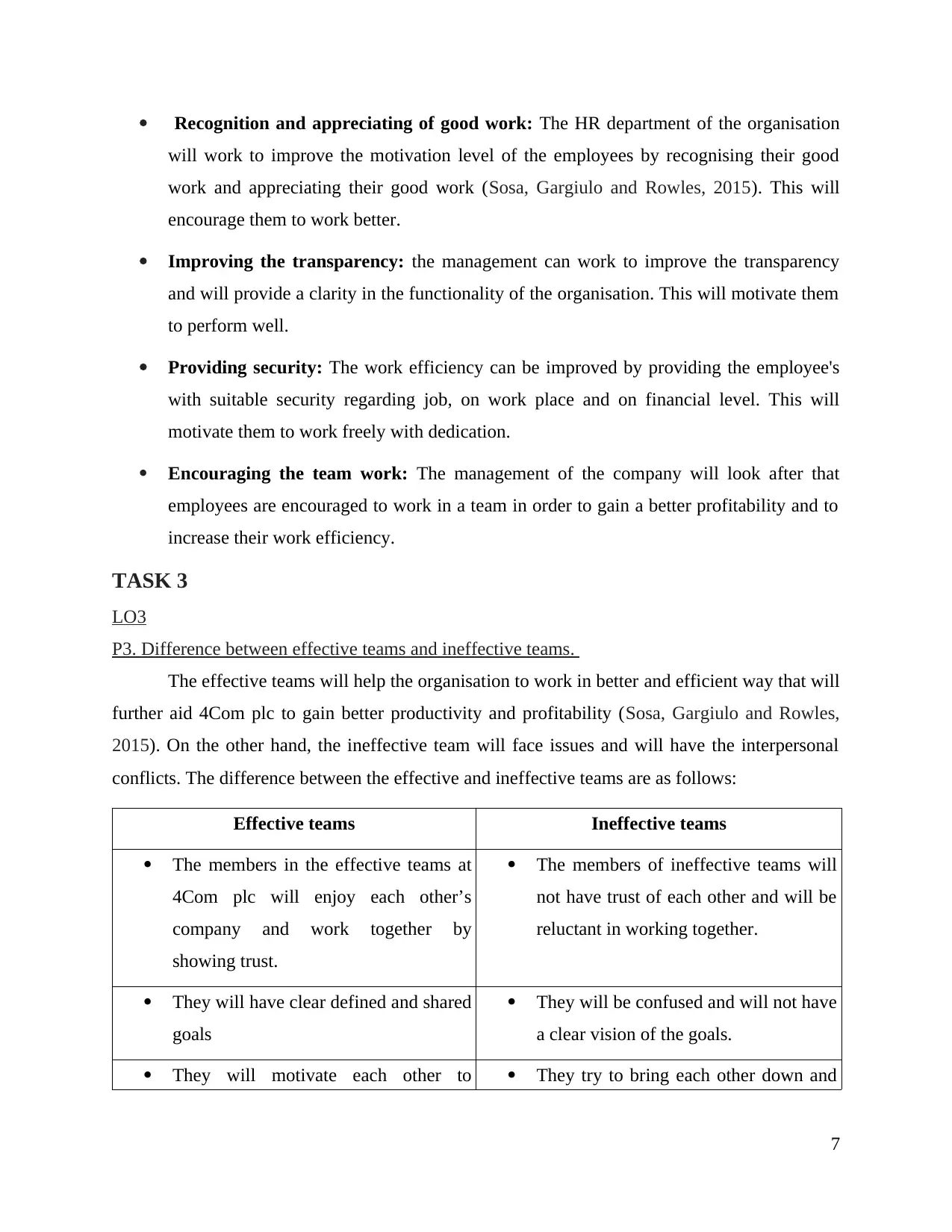
Recognition and appreciating of good work: The HR department of the organisation
will work to improve the motivation level of the employees by recognising their good
work and appreciating their good work (Sosa, Gargiulo and Rowles, 2015). This will
encourage them to work better.
Improving the transparency: the management can work to improve the transparency
and will provide a clarity in the functionality of the organisation. This will motivate them
to perform well.
Providing security: The work efficiency can be improved by providing the employee's
with suitable security regarding job, on work place and on financial level. This will
motivate them to work freely with dedication.
Encouraging the team work: The management of the company will look after that
employees are encouraged to work in a team in order to gain a better profitability and to
increase their work efficiency.
TASK 3
LO3
P3. Difference between effective teams and ineffective teams.
The effective teams will help the organisation to work in better and efficient way that will
further aid 4Com plc to gain better productivity and profitability (Sosa, Gargiulo and Rowles,
2015). On the other hand, the ineffective team will face issues and will have the interpersonal
conflicts. The difference between the effective and ineffective teams are as follows:
Effective teams Ineffective teams
The members in the effective teams at
4Com plc will enjoy each other’s
company and work together by
showing trust.
The members of ineffective teams will
not have trust of each other and will be
reluctant in working together.
They will have clear defined and shared
goals
They will be confused and will not have
a clear vision of the goals.
They will motivate each other to They try to bring each other down and
7
will work to improve the motivation level of the employees by recognising their good
work and appreciating their good work (Sosa, Gargiulo and Rowles, 2015). This will
encourage them to work better.
Improving the transparency: the management can work to improve the transparency
and will provide a clarity in the functionality of the organisation. This will motivate them
to perform well.
Providing security: The work efficiency can be improved by providing the employee's
with suitable security regarding job, on work place and on financial level. This will
motivate them to work freely with dedication.
Encouraging the team work: The management of the company will look after that
employees are encouraged to work in a team in order to gain a better profitability and to
increase their work efficiency.
TASK 3
LO3
P3. Difference between effective teams and ineffective teams.
The effective teams will help the organisation to work in better and efficient way that will
further aid 4Com plc to gain better productivity and profitability (Sosa, Gargiulo and Rowles,
2015). On the other hand, the ineffective team will face issues and will have the interpersonal
conflicts. The difference between the effective and ineffective teams are as follows:
Effective teams Ineffective teams
The members in the effective teams at
4Com plc will enjoy each other’s
company and work together by
showing trust.
The members of ineffective teams will
not have trust of each other and will be
reluctant in working together.
They will have clear defined and shared
goals
They will be confused and will not have
a clear vision of the goals.
They will motivate each other to They try to bring each other down and
7
Paraphrase This Document
Need a fresh take? Get an instant paraphrase of this document with our AI Paraphraser
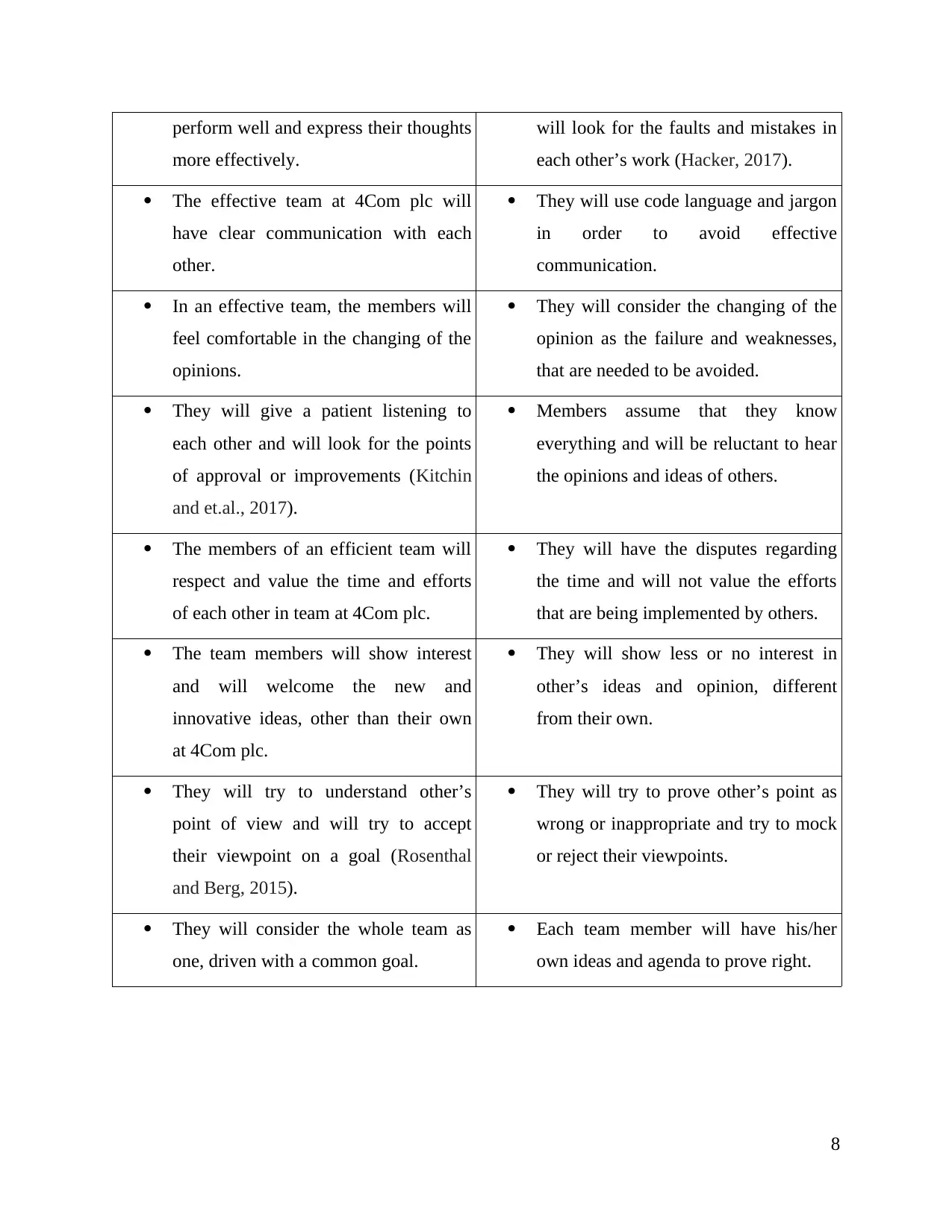
perform well and express their thoughts
more effectively.
will look for the faults and mistakes in
each other’s work (Hacker, 2017).
The effective team at 4Com plc will
have clear communication with each
other.
They will use code language and jargon
in order to avoid effective
communication.
In an effective team, the members will
feel comfortable in the changing of the
opinions.
They will consider the changing of the
opinion as the failure and weaknesses,
that are needed to be avoided.
They will give a patient listening to
each other and will look for the points
of approval or improvements (Kitchin
and et.al., 2017).
Members assume that they know
everything and will be reluctant to hear
the opinions and ideas of others.
The members of an efficient team will
respect and value the time and efforts
of each other in team at 4Com plc.
They will have the disputes regarding
the time and will not value the efforts
that are being implemented by others.
The team members will show interest
and will welcome the new and
innovative ideas, other than their own
at 4Com plc.
They will show less or no interest in
other’s ideas and opinion, different
from their own.
They will try to understand other’s
point of view and will try to accept
their viewpoint on a goal (Rosenthal
and Berg, 2015).
They will try to prove other’s point as
wrong or inappropriate and try to mock
or reject their viewpoints.
They will consider the whole team as
one, driven with a common goal.
Each team member will have his/her
own ideas and agenda to prove right.
8
more effectively.
will look for the faults and mistakes in
each other’s work (Hacker, 2017).
The effective team at 4Com plc will
have clear communication with each
other.
They will use code language and jargon
in order to avoid effective
communication.
In an effective team, the members will
feel comfortable in the changing of the
opinions.
They will consider the changing of the
opinion as the failure and weaknesses,
that are needed to be avoided.
They will give a patient listening to
each other and will look for the points
of approval or improvements (Kitchin
and et.al., 2017).
Members assume that they know
everything and will be reluctant to hear
the opinions and ideas of others.
The members of an efficient team will
respect and value the time and efforts
of each other in team at 4Com plc.
They will have the disputes regarding
the time and will not value the efforts
that are being implemented by others.
The team members will show interest
and will welcome the new and
innovative ideas, other than their own
at 4Com plc.
They will show less or no interest in
other’s ideas and opinion, different
from their own.
They will try to understand other’s
point of view and will try to accept
their viewpoint on a goal (Rosenthal
and Berg, 2015).
They will try to prove other’s point as
wrong or inappropriate and try to mock
or reject their viewpoints.
They will consider the whole team as
one, driven with a common goal.
Each team member will have his/her
own ideas and agenda to prove right.
8
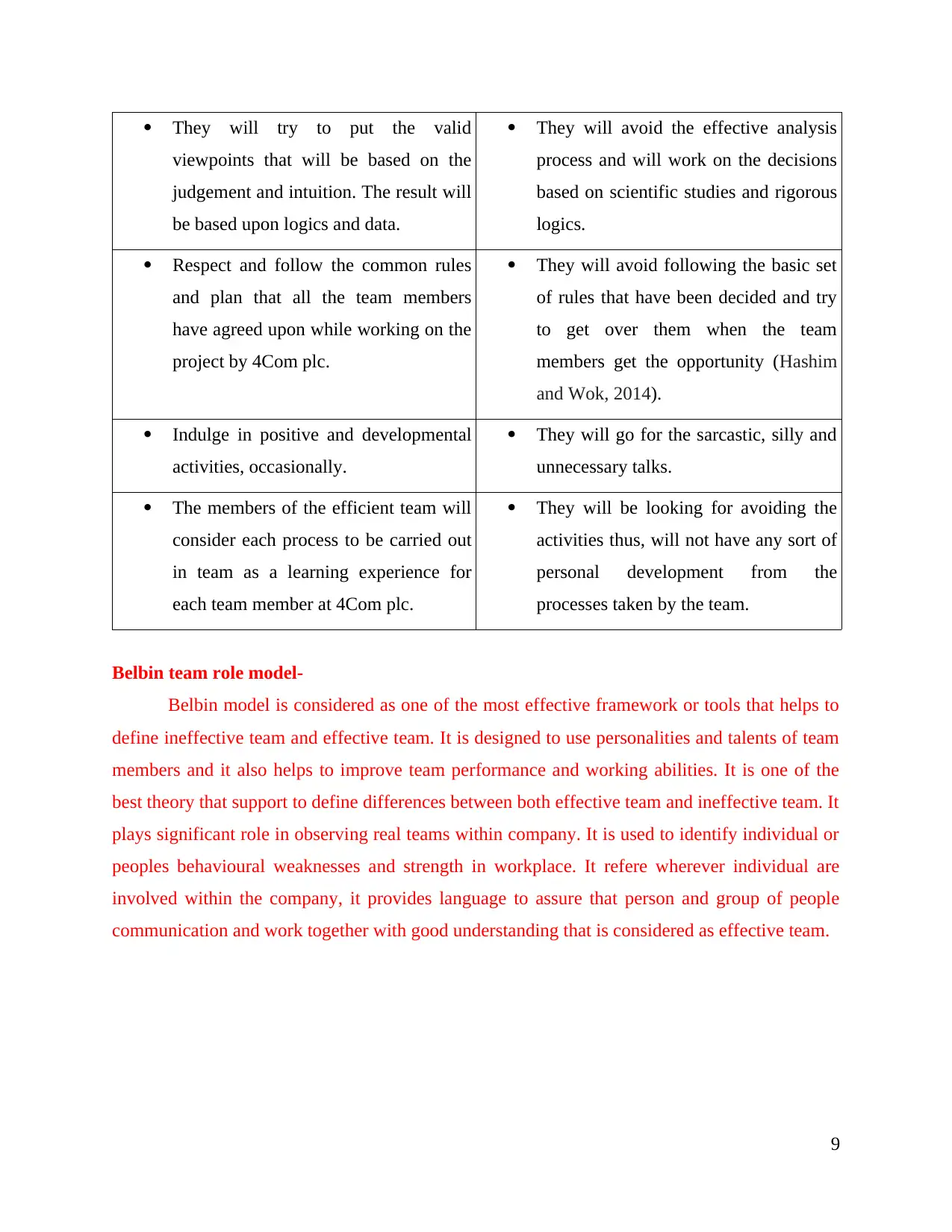
They will try to put the valid
viewpoints that will be based on the
judgement and intuition. The result will
be based upon logics and data.
They will avoid the effective analysis
process and will work on the decisions
based on scientific studies and rigorous
logics.
Respect and follow the common rules
and plan that all the team members
have agreed upon while working on the
project by 4Com plc.
They will avoid following the basic set
of rules that have been decided and try
to get over them when the team
members get the opportunity (Hashim
and Wok, 2014).
Indulge in positive and developmental
activities, occasionally.
They will go for the sarcastic, silly and
unnecessary talks.
The members of the efficient team will
consider each process to be carried out
in team as a learning experience for
each team member at 4Com plc.
They will be looking for avoiding the
activities thus, will not have any sort of
personal development from the
processes taken by the team.
Belbin team role model-
Belbin model is considered as one of the most effective framework or tools that helps to
define ineffective team and effective team. It is designed to use personalities and talents of team
members and it also helps to improve team performance and working abilities. It is one of the
best theory that support to define differences between both effective team and ineffective team. It
plays significant role in observing real teams within company. It is used to identify individual or
peoples behavioural weaknesses and strength in workplace. It refere wherever individual are
involved within the company, it provides language to assure that person and group of people
communication and work together with good understanding that is considered as effective team.
9
viewpoints that will be based on the
judgement and intuition. The result will
be based upon logics and data.
They will avoid the effective analysis
process and will work on the decisions
based on scientific studies and rigorous
logics.
Respect and follow the common rules
and plan that all the team members
have agreed upon while working on the
project by 4Com plc.
They will avoid following the basic set
of rules that have been decided and try
to get over them when the team
members get the opportunity (Hashim
and Wok, 2014).
Indulge in positive and developmental
activities, occasionally.
They will go for the sarcastic, silly and
unnecessary talks.
The members of the efficient team will
consider each process to be carried out
in team as a learning experience for
each team member at 4Com plc.
They will be looking for avoiding the
activities thus, will not have any sort of
personal development from the
processes taken by the team.
Belbin team role model-
Belbin model is considered as one of the most effective framework or tools that helps to
define ineffective team and effective team. It is designed to use personalities and talents of team
members and it also helps to improve team performance and working abilities. It is one of the
best theory that support to define differences between both effective team and ineffective team. It
plays significant role in observing real teams within company. It is used to identify individual or
peoples behavioural weaknesses and strength in workplace. It refere wherever individual are
involved within the company, it provides language to assure that person and group of people
communication and work together with good understanding that is considered as effective team.
9
⊘ This is a preview!⊘
Do you want full access?
Subscribe today to unlock all pages.

Trusted by 1+ million students worldwide
1 out of 17
Related Documents
Your All-in-One AI-Powered Toolkit for Academic Success.
+13062052269
info@desklib.com
Available 24*7 on WhatsApp / Email
![[object Object]](/_next/static/media/star-bottom.7253800d.svg)
Unlock your academic potential
Copyright © 2020–2026 A2Z Services. All Rights Reserved. Developed and managed by ZUCOL.





